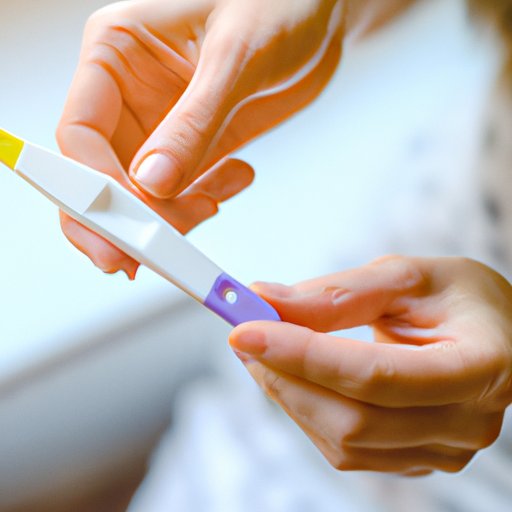
Introduction
Wondering if you’re pregnant can be an exciting and nerve-wracking moment for many women. Whether you’re trying to conceive or not, knowing if you’re pregnant is an important step in planning for a healthy pregnancy. In this article, we will explore the signs and symptoms of early pregnancy, home pregnancy tests, prenatal care, pregnancy myths, preparing for pregnancy, coping with a negative pregnancy test, and seeking support during pregnancy. By the end of this article, you will be equipped with the knowledge you need to determine if you’re pregnant and what to do next.
Signs and Symptoms of Early Pregnancy
One of the earliest signs of pregnancy is a missed period. However, every woman’s body is different, and some women may experience other signs and symptoms before a missed period. Common early pregnancy symptoms include nausea, vomiting, fatigue, breast tenderness, and frequent urination. To track and monitor these symptoms, keep a journal or download an app designed for tracking fertility and pregnancy. Paying attention to your body is key, and if you suspect you might be pregnant, listen to what your body is telling you.
Home Pregnancy Tests
Home pregnancy tests are simple urine tests that can detect pregnancy. These tests work by detecting the pregnancy hormone human chorionic gonadotropin (hCG) in your urine. Most home pregnancy tests recommend that you wait until the first day of your missed period to take the test. It’s important to follow the instructions on the test carefully, as this can affect the accuracy of the results. While most home pregnancy tests are accurate, it’s possible to get a false negative result, especially if you take the test too early. If you get a negative result but still suspect you might be pregnant, wait a few more days and take another test.
The Importance of Prenatal Care
Scheduling your first prenatal visit early in pregnancy is essential for the health of both you and your baby. Prenatal care allows for early detection and management of any potential issues that may arise during pregnancy. During these visits, your healthcare provider will monitor the growth and development of your baby, check for any health problems, and give you important information on how to care for yourself and your growing baby. It’s important to choose a healthcare provider you trust and feel comfortable with to ensure the best care for you and your baby.
Pregnancy Myths Debunked
There are many pregnancy myths that have been around for generations. For example, the myth that morning sickness only happens in the morning, or that the “pregnancy glow” makes you look and feel your best when pregnant. While these myths may sound believable, they are not always accurate. In reality, morning sickness can happen at any time of the day, and the “pregnancy glow” is more likely due to an increase in blood flow and hormones than anything else. It’s important to separate fact from fiction to have a healthy pregnancy.
Preparing for Pregnancy
Before you become pregnant, you can take steps to prepare your body for a healthy pregnancy. This includes eating a balanced and nutritious diet, staying active with moderate exercise, avoiding tobacco, alcohol, and drugs, and monitoring any chronic health conditions that may affect your pregnancy. Talk to your healthcare provider about any steps you can take to ensure a healthy pregnancy.
Coping with a Negative Pregnancy Test
While the thought of being pregnant can be exciting, a negative pregnancy test can be disheartening. Remember that it’s normal to feel disappointed, but also know that a negative pregnancy test doesn’t mean you won’t ever be pregnant. Take care of yourself emotionally by practicing self-care and seeking emotional support from your partner, friends, and family.
Seeking Support During Pregnancy
Seeking emotional and social support during pregnancy can make all the difference. Talk to your partner, family, and friends about your pregnancy, and seek out supportive resources, such as support groups or online forums for pregnant women. Don’t be afraid to ask for help when you need it, as pregnancy can be both physically and emotionally demanding.
Conclusion
Whether you’re trying to conceive or not, knowing if you’re pregnant is an important step in planning for a healthy pregnancy. By being informed about the signs and symptoms of early pregnancy, home pregnancy tests, prenatal care, and debunking pregnancy myths, you can take proactive steps to ensure a healthy pregnancy. Remember to seek emotional and social support during pregnancy and take care of yourself and your growing baby.





